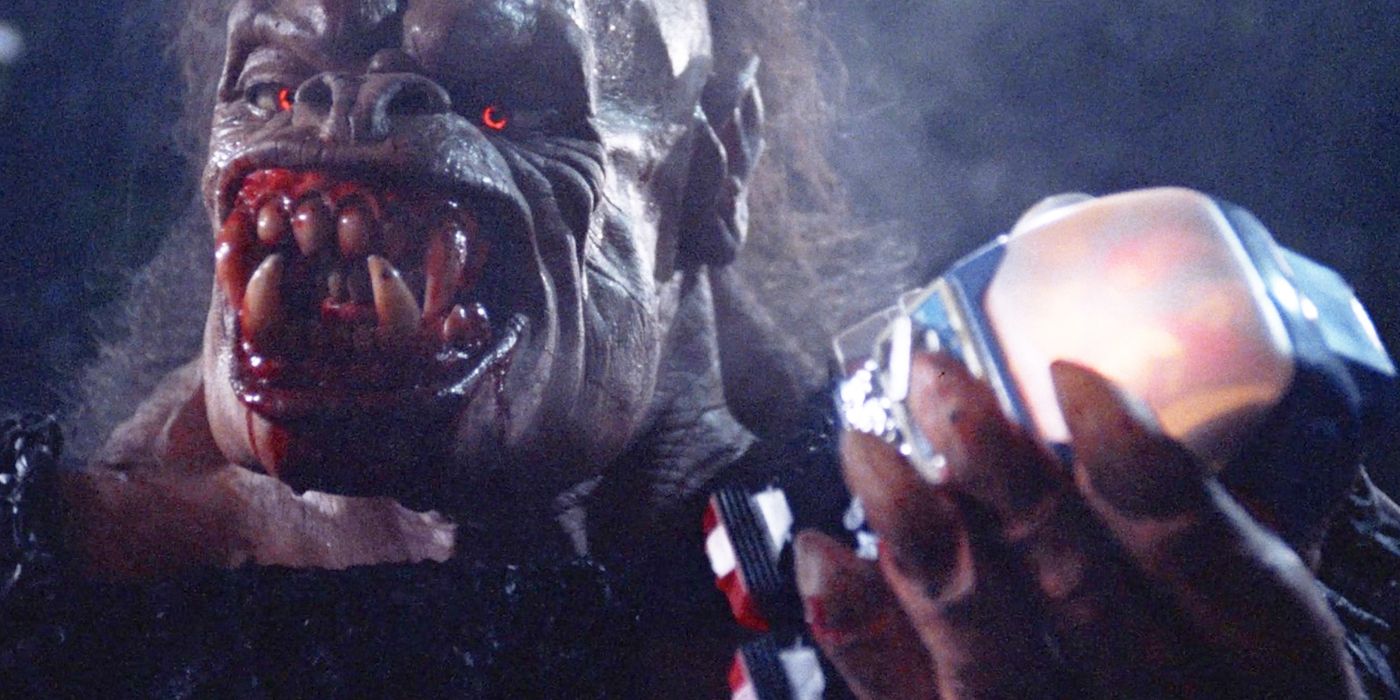The ill-remembered and oft-forgotten Rawhead Rex is a cinematic disaster, a laughably schlocky monster movie that is perhaps most notable for butchering its screenwriter's original ideas and intentions. It's no wonder that Clive Barker disowned the final product considering its cheapness and especially goofy creature costume, as the horror writer, who is something of a legend in the community, felt the film ruined his more satirical and unsettling vision.
The Rawhead Rex movie is, in fact, based on a short story written by Clive Barker that was included in the third volume of his Books of Blood collection. The plot and setting of both versions share similarities, taking place in a bucolic countryside and centering on a demonic, pagan creature that escapes from its magical imprisonment. The short story, however, is a brutal but strangely satirical piece that is partly told from the perspective of the monster, involving lots of child killings and not-so-subtle imagery poking fun at religion, urban-rural tensions, and masculinity run amok.
After all, Rawhead himself was supposed to resemble a giant phallus, and is eventually thwarted by a talisman depicting his only weakness: a pregnant woman. The description is not too dissimilar from the violent rampage and the sexual imagery of Alien and that film's terrifyingly perverted Xenomorph. Rawhead Rex as a film, in contrast, is anything but terrifying, cursed by the sort of generic "monster on the loose" storyline that Barker was trying to parody as well as an ugly, unimaginative monster design complete with a cheap, thrown-together suit. While it's no surprise that Barker hated the final version of Rawhead Rex, there are very specific reasons for his distaste.
The mind of Clive Barker is known for conjuring some of horror's most disturbing and bizarre creations, so the sort of B-movie schlock in Rawhead Rex is arguably the antithesis to his signature style. This is largely due to direction that made no attempt to even try to hide the plastic seams and rubbery textures of the Rawhead Rex costume. It wasn't just the absolute shabbiness of the star monster, though, that roused the ire of Barker. It was the way the film was a gross misinterpretation of his intended effect.
The movie was released at the height of Britain's "video nasties" scare, meaning that those involved with making final creative decisions on the project were frightened of potential censorship. As a result, the more visceral elements of the original story were not included, although there is one notorious scene of Rawhead Rex urinating on a priest that did make the final cut. Barker claims that he was barely consulted on a creative level beyond the script's draft, and never even visited the set. He seemed particularly upset about the loss of the satirical element, stating in the November - December 1987 of Nexus magazine:
"Monster on the rampage stories are about the phallic principle. Large males run around terrorizing women... Now, the gag only works if you understand the subtext. Otherwise, it's about this dumb monster running around. I couldn't get them to understand that the whole movie had to smell of sex. When this thing appeared you had to think it was a d**k, but they didn't get the joke. And it was a joke, that was the point..."
All this criticism makes one wonder if Barker is trying to take the blame off himself. After all, he did write the screenplay, even if his vision for Rawhead Rex was torn to shreds. To Barker, though, it's a clear-as-day example of filmmaking execution that's at odds with what was written on the page. Perhaps the project was doomed from the start with a team of producers who couldn't grasp his concept. Steve Niles (of 30 Days of Night fame) adapted the story in comic form in 1993, giving viewers a glimpse at what could have been, while Barker himself vowed to grab onto the creative reigns on his next project. This turned out to be the legendarily disturbing Hellraiser, which proved that there is, in fact, a way to bring the horror maestro's dark psychology to screen in a successful way that honors his source material.


